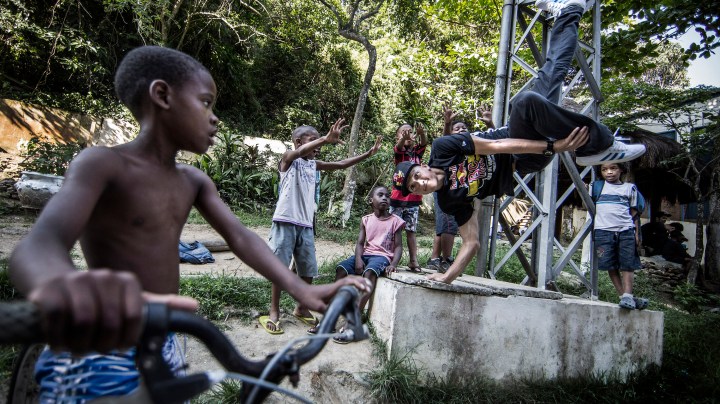The 2020 Olympics Are Canceled, but This Guy Is Committed to Seeing Breakdance at Paris’ 2024 Olympics

Luis "Arex" Montano of Colombia performs at Favela Cantagalo as local chidren look on prior to the Red Bull BC One breakdancing world final on December 6, 2012 in Rio de Janeiro, Brazil. Photo by Dean Treml/Red Bull via Getty Images
After mounting concern over the coronavirus pandemic, Japan Prime Minister Shinzo Abe and the International Olympic Committee officially postponed the 2020 Tokyo Summer Olympics for a year. In a statement released yesterday, officials said that athletes would compete on “a date beyond 2020 but not later than summer 2021.” The move is historically unprecedented; up until this week, the Olympics had only been canceled or postponed in times of war.
While the delay is a crushing blow to athletes who have been training, it won’t impact the 2024 Olympics set to take place in Paris. Planning will continue as scheduled, the head of the Paris organizing Tony Estanguet told the news agency AFP recently. In fact, preparations are already underway.
One of the people who’s working to envision what the 2024 competition will look like is Antonio Castillo—a Mexican-born resident in the D.C. area hoping to shake up the games with the first-ever national breakdancing team.
“Nobody has ever talked about creating an eligible USA breaking team before. So I took it on,” Castillo told PRI. “I’m really passionate about it. And I just feel like there’s nothing anybody can do to stop it.”

In an effort to attract younger audiences and fans, breakdancing is one of the sports the International Olympic Committee provisionally agreed to add to the 2024 program last year (along with skateboarding, climbing and surfing). Yet, the final verdict on whether or not to incorporate them won’t come until December. But, Castillo isn’t wasting any time looking for potential dancers to compete on an American team.
Castillo moved to Virginia from Mexico when he was nine years old and says that dancing became one way he dealt with the difficulties adjusting to life in the U.S. “I didn’t speak any English. It was hard to make friends. There wasn’t any Mexican people there,” he said. “So what did I do? I danced.”
Now, he’s committed to seeing breakdancing at the Olympics. He opened The Lab Breakin’ School in Takoma Park, Maryland to coach kids and even came up with a point system and rules for the sport, according to PRI. “It’s the sport of the future,” he said decidedly.
